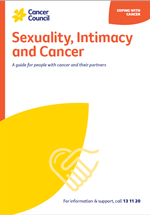- Home
- Prostate cancer
- Managing side effects
- Restoring your sex life
Restoring your sex life
Prostate cancer can affect your sex life physically and emotionally. How much will depend on factors such as the cancer treatment and its side effects, your general health, how you and your partner/s communicate, and your self-confidence.
It takes time to adjust to changes in your sex drive, your self-esteem and relationships.
Learn more about:
Telling a new partner
Deciding when to tell a potential sexual partner about your cancer experience isn’t easy, and you may even avoid dating or sex.
It can be helpful to wait until you and your new partner have developed a mutual level of trust and caring. You might prefer to talk with a new partner about your concerns before becoming sexually intimate. By communicating openly, you avoid misunderstandings and may find that your partner is more accepting and supportive.
For more on this, see Sexuality, intimacy and cancer or listen to our podcast Sex and Cancer below.
Managing changes in your sex life
- Talk about the changes and your feelings about sex. If you have a partner, changes may affect you both. Reassure them that intimacy is still possible and important to you.
- Focus on giving and receiving pleasure in different ways without sexual penetration. Other ways of expressing love include touching, holding, caressing and massage.
- Try adult products (e.g. sex toys, dildos, vibrators) to spark interest in sex. Your partner can satisfy themselves, either alone or with you present.
- Take time to get used to any changes. Look at yourself naked in the mirror and touch your genitals to feel any differences or soreness.
- Start slowly – touch each other’s skin, then genitals.
- When you feel ready, try vaginal intercourse even with a partial erection. This may encourage more and better erections. A partial erection may not be strong enough for anal sex but you could work up to this using stimulation to encourage stronger erections.
- Explore and understand any changes by masturbating.
- Ask your partner to help you reach orgasm through gentle hand-stroking. Use silicone-based lubricants for prolonged stimulation.
- Try different positions to find what feels comfortable. Kneeling or standing may also help with erections.
- Mindfulness techniques may help you stay in the moment. Listen to our Finding Calm During Cancer podcast for exercises.
- Talk to your doctor, a sexual health physician or counsellor if the changes are causing depression or relationship problems.
- Learn more about sex after prostate cancer at Prostate Cancer Foundation of Australia or see Sexuality, intimacy and cancer.
→ READ MORE: Fertility problems
Podcast: Sex and Cancer
Listen to more of our podcast for people affected by cancer
More resources
Prof Declan Murphy, Consultant Urologist, Director – Genitourinary Oncology, Peter MacCallum Cancer Centre and The University of Melbourne, VIC; Alan Barlee, Consumer; Dr Patrick Bowden, Radiation Oncologist, Epworth Hospital, Richmond, VIC; Bob Carnaby, Consumer; Dr Megan Crumbaker, Medical Oncologist, St Vincent’s Hospital Sydney, NSW; Henry McGregor, Health Physiotherapist, Adelaide Men’s Health Physio, SA; Jessica Medd, Senior Clinical Psychologist, Department of Urology, Concord Repatriation General Hospital and Headway Health, NSW; Dr Gary Morrison, Shine a Light (LGBTQIA+ Cancer Support Group); Caitriona Nienaber, 13 11 20 Consultant, Cancer Council WA; Graham Rees, Consumer; Kerry Santoro, Prostate Cancer Specialist Nurse Consultant, Southern Adelaide Local Health Network, SA; Prof Phillip Stricker, Chairman, Department of Urology, St Vincent’s Private Hospital, NSW; Dr Sylvia van Dyk, Brachytherapy Lead, Peter MacCallum Cancer Centre, VIC.
View the Cancer Council NSW editorial policy.
View all publications or call 13 11 20 for free printed copies.

